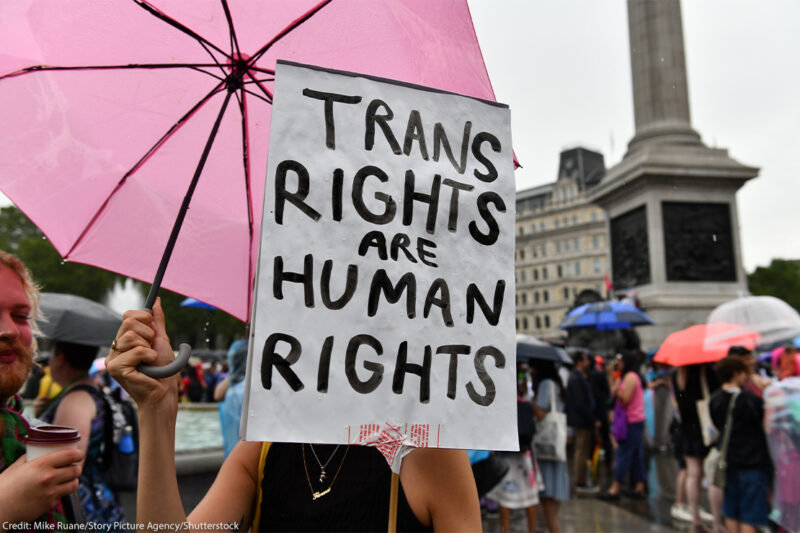In Kansas, the ACLU Is Challenging Anti-Trans Laws in Court, and by Building Community


In 2023, Kansas enacted a law attempting to define “transgender” out of existence by restricting the definition of a “woman” to the biological function of producing ova. Not only does this definition negate the experiences of trans women and girls, but it also excludes entire categories of women who are not transgender, such as post-menopausal women, women experiencing reproductive challenges, and intersex women.
Despite being passed under the dubious title “Women’s Bill of Rights,” this law has not been used to create any new protections for women, nor improve support for women’s initiatives or resources. Instead, the law has been used to incite fear among transgender Kansans and limit their ability to live freely in our state.

Kansas v. Harper
Five transgender Kansans are challenging an effort by Kansas Attorney General Kobach to require the state to issue driver’s licenses with a...
Source: American Civil Liberties Union
Kansas Attorney General Kris Kobach has claimed the new law restricts trans Kansans from updating the gender marker on their state IDs. For years, Kansas had allowed transgender residents and those born here to change the gender marker on their driver’s licenses and birth certificates. Despite having these affirming policies without any identified administrative, public safety, or other concerns, the attorney general took to the courts to pressure state agencies into removing these policies.
In response, the Kansas Department of Health and Environment announced a policy change banning trans Kansans from updating the gender marker on their birth certificates. The Kansas Department of Revenue, which issues driver’s licenses, declined to change its policy — prompting Kobach to sue KDOR to force a policy change in Kansas v. Harper.
The ACLU of Kansas, along with ACLU’s LGBTQ & HIV Project and local partners, intervened in that lawsuit on behalf of five transgender Kansans to assert their right to a driver’s license that does not forcibly out them. Unfortunately, three days after the suit was filed and prior to our intervention, the judge issued a temporary order blocking trans Kansans from changing their license’s gender marker. The order, which remains in force, also requires a previously changed gender marker to revert back to the inaccurate marker when the license expires or is amended in the future.
This means trans people are not currently able to access accurate and affirming state identity documents in Kansas. Having an ID that reflects a trans person’s lived identity is crucial to their safety, privacy, and bodily autonomy. The research shows that lack of access to an affirming ID harms trans people, making them vulnerable to forced outing and increasing their chances of experiencing discrimination, harassment, and violence.
The ACLU of Kansas is going to keep fighting in Kansas v. Harper as long as necessary. But we also understand that trans people cannot wait months (or years) for a ruling from the courts affirming their basic constitutional rights. They must use their IDs in daily life for countless reasons, from picking up mail to purchasing items at the store. That’s why we began to partner with local LGBTQ advocates to uplift an alternative option for trans Kansans — gender-affirming federal IDs, like passport cards and passport booklets.
Trans people can self-attest their gender when applying for a federal ID, meaning they do not need a state ID that verifies their selected gender. For trans Kansans, this means they can still obtain a federal ID that reflects the gender they live as. The ACLU of Kansas and our community partners are thrilled that despite legislative and political attacks on trans Kansans, we are still able to support our community and reduce the harm flowing from anti-trans policies in our state.
The ACLU of Kansas has hosted numerous Know Your Rights events and Federal ID Clinics to provide resources and reassurance to trans Kansans. People who come to these events have been relieved and overwhelmed by the community support they experience. In the face of discriminatory laws trying to erase their existence, trans Kansans are coming together to share information and support each other. The power of community persists.
In the wake of nationwide anti-trans legislation and rhetoric over the past few years, events where trans Kansans can come together are even more important. In a rural state like Kansas where people can feel isolated, these events are not only an opportunity for people to access the assistance they need, but they also allow folks to connect and share in their pain and in their joy. One mother I met at a virtual event was ecstatic to know she could get her child a gender-affirming federal ID before they started college. She feared that her child would not be able to enroll for college with the correct name and gender marker because of the new anti-trans law.
Despite efforts by anti-trans extremists to try to deny our humanity, to isolate us, trans Kansans are not going anywhere. Thousands of trans people call Kansas home, and we will remain. We will continue to define our own lives, support each other, and build power. These laws may have produced a wide unknown but the power of our community is deeply rooted.

